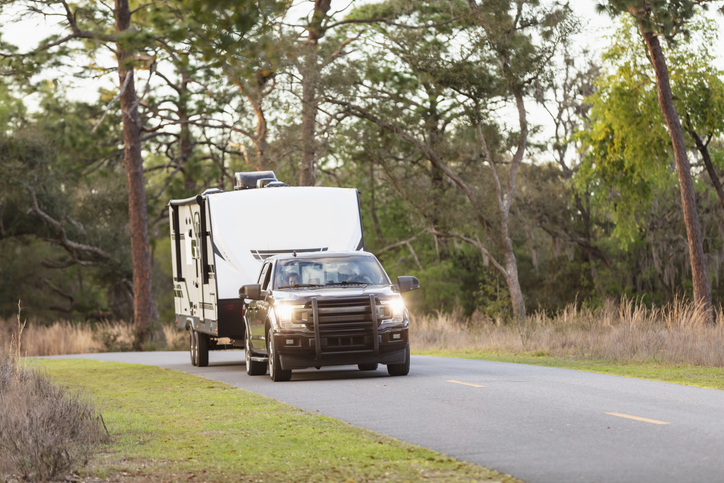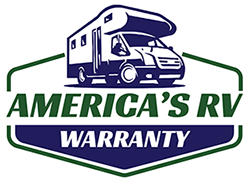
If you've settled on buying a towable RV, your first crash course should be in RV trailer towing tips. Sure, this may not be your first rodeo—you may have rented or borrowed a friend's motorhome, but when it comes to hitching up and towing a trailer, it's a different ball game altogether. Driving motorhomes and towing a trailer are two very different things, so before hitting the road or even buying or renting a towable RV, you must first understand the ins and outs of safe RV towing. As you might already imagine, there are significant differences in towing between various types of RVs. For instance, understanding weight distribution is one of the most important considerations you should factor in when choosing between towables, such as travel trailers, toy haulers, and fifth-wheel RVs.
Because safety is paramount when towing any RV, this article will provide insight into some of the most important RV trailer towing tips. And as a bonus for sticking around and reading this guide, you'll also learn how to tow your car behind a motorized RV. Let's dive right in.
Before getting into the RV trailer towing tips, let's first define some words you'll come across later on in this article for better understanding:
Now that you understand the basics, let's get into the towing tips you can incorporate the next time you hit the road.
You don't want a situation where you end up with a tow vehicle that isn't capable of safely towing your chosen RV. As such, it's best to buy the RV before the towing truck because different towing vehicles have different towing capacities. Usually, the weight and dimensions of the RV should dictate the specifications needed for the tow vehicle in terms of the right engine power, braking capacity, and stability for a smooth towing experience.
Hitch compatibility refers to the suitability of your tow vehicle's hitch system to the specific type and weight of the trailer you intend to tow. Hitch compatibility is essential because it directly affects the towing stability and overall safety on the road. To ensure compatibility, you must first understand the different types of hitches and their corresponding trailers:
Knowing the height, width, and length of your trailer is also crucial for several reasons. For one, your trailer's height matters because if it's too tall, you'll have trouble passing under bridges, overpasses, low-hanging obstacles like tree branches, and RV campsite entrances.
As for the width and length, these play an important part when driving on the road and parking in campsites. For instance, safely making sharp bends on the roads requires you to know how long and wide your recreational vehicle is so you can determine how much space you need to maneuver without causing accidents. These dimensions are also important for choosing suitable parking spots in public areas and campgrounds.
Just like your towing vehicle, your towable RV needs occasional maintenance or servicing. While there isn't a hard, fast rule for how frequently you should service your recreational vehicle, it's best to follow your manufacturer's manual. Some things to keep in mind include:
Here are some driving tips to consider when towing your RV trailer.
When driving with your RV towed in high traffic areas, always maintain some distance between you and the car in front. This gives you room to brake comfortably and safely because sudden stops can be more challenging when towing a heavy load.
While speed limits for towing recreational vehicles vary by state, a great rule of thumb to follow is to keep it 10 mph slower than the maximum speed limit indicated on the road you're using. Most speed limits in the U.S. vary between 50 and 65 mph, so it's best to drive within this range. Nonetheless, some states have specific trailer towing speeds, like California at 55 mph on a two-lane undivided highway, Florida at 65 mph, Alabama at 70 mph, and Hawaii at 60 mph.
Though not a requirement in all states, using safety chains gives you peace of mind when you're out on the open road. They act as a failsafe for when the hitch fails by keeping the trailer connected to your towing truck. You can use them on all types of towable RVs, except for fifth-wheel RVs, because their kingpin mechanism provides a secure enough connection. Alternatively, you can use a breakaway switch. This device slows down and eventually stops your RV trailer if it gets detached from your towing truck.
Some weather conditions, such as wind, rain, and snow, may affect your ability to control your towable RV. As such, you must take extra precautions for your safety, including:
Going uphill and downhill with a trailer RV towed on your truck can be challenging for newer drivers. When going uphill, you risk your engine overheating and the vehicle stopping unexpectedly due to the extra weight you're carrying. To avoid this, it's best to maintain steady, slow speeds and shift to a lower gear to maintain power.
Experienced RVers will tell you that going uphill is easier than downhill, so you must take extra precautions. For one, you want to control your speed (so you don't go too fast) and prevent your brakes from failing. You can achieve this by using engine braking, by downshifting to a lower gear, or intermittent braking, which means allowing brakes to cool between applications as needed.
Before we wrap up this article, let's quickly go over some tips you can leverage if you need to bring your car together with your motorhome on your road trip:
The RV trailer towing tips discussed in this article can give you some confidence on the road that nothing is likely to go wrong. But even with the best gear and utmost precautions, issues are always possible. At America's RV Warranty, we know this all too well. Our unbeatable extended warranty coverage can help you take care of unexpected and expensive costs caused by mechanical breakdowns. So, whether you own a fifth-wheel, pop-up camper or a toy hauler, you can go on the road knowing that we have your back.
Request a free quote today.
